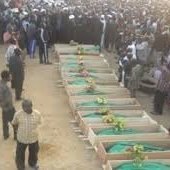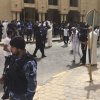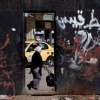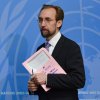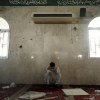
Crimes against the Shia in Nigeria on the Brink of Crimes against Humanity
Crimes against the Shia in Nigeria on the Brink...
The initial responsibility of the fight against international crimes is with governments under whose jurisdiction these types of crimes which are concerns for the international community, take place. Therefore in instances where the government lacks capability and or interest to investigate perpetrators of international crimes, the way is opened for these crimes to be investigated through international channels and the application of complementing competence of the ICC, in the event of the outcome of other conditions. The international criminal justice history has shown that governments lack interest or have serious intentions to apply justice where forces associated to them are those that accused of committing international crimes; and this results in the impunity of the perpetrators of international crimes. Ending the impunity culture and hearing the voiceless voices of the victims of international crimes is a message that governments have put the ICC in charge of fulfillment. This article intends for the possibility of the criminal investigation of the Shia on bloody Sunday 13 December to be done at the international level and by the ICC; particularly when the Nigerian army is involved in this incident and the possibility of the government's delay in the proper investigation of this may cause serious obstacles.
1 - Nigeria is a member of the ICC. The government signed the Rome Statute on 27 December 2001. Therefore ICC has jurisdiction towards crimes that are committed by Nigerians within the country's sovereign borders, from 1 July 2002, in other words from the enforcement of the Rome Statute, and the operational existence of the Court. The ICC is a permanent organization and its jurisdiction towards member states does not have a time limit.
2 - With a population of approximately 170 million, Nigeria is made up of numerous tribes. The contemporary history of Nigeria shows a large number of age old bloody conflicts, most of which have ethnic and religious roots. In November 2010, the ICC prosecutor began preliminary examination proceedings on the situation in Nigeria. Preliminary examination is a process through which the ICC prosecutor on the basis of information received and collected, reviews whether on the basis of logic can official investigations begin on a condition that has been stated in the ICC Statute or not. These conditions include, the jurisdiction of the Court, acceptability and in the interest of justice. Nigeria's situation is still in the preliminary examination process. Among the various crises and conflicts within Nigeria that are being reviewed by the prosecutor, the thing that in the view of the prosecutor falls within the jurisdiction of the Court is the crimes that have been committed by the Boko Haram terrorist group. Initially the ICC prosecutor had deemed the crimes committed by Boko Haram as examples of crimes against humanity. Nonetheless from 2013 with the inclusion of the existence of a non-international armed conflict between Boko Haram and the Nigerian government, war crimes were also added to the charges against this terror group. Currently and following the change of government in Nigeria in 2015, the ICC prosecutor is examining the complementing competence and in other words, the situation and the approach of the Nigerian government towards the investigation of crimes committed by Boko Haram, crimes committed by Nigerian security forces during the crackdowns on Boko Haram are in the working agenda. The entrance of the Court to the situation in Nigeria facilitates the basis for the extension of the jurisdiction of the ICC to other crimes committed within the jurisdiction of this government.
3 - The starting point of the activities of the ICC, is the start of the preliminary examination proceedings. For the launch of the preliminary examination towards this situation it is only necessary for the prosecutor to establish that the situation is not manifestly outside of the competence jurisdiction of the Court. The examination of other conditions and finer review of the competence of the Court is done after the start of the preliminary examination procedure. Therefore if the situation is within the Court's jurisdiction from the time and place aspects, and the committed crimes are prima facie in accordance with ICC crimes, the prosecutor is obliged to start the preliminary examination process and preliminary investigation to get further information to the more careful review of its competence. The 13 September attack against the Nigerian Shia has taken place within the jurisdiction of a member state, and during a time where the ICC has jurisdiction over the government, therefore the time and place jurisdiction of the ICC is fulfilled and the main condition of subject matter jurisdiction of the ICC is whether one of these crimes is within the juridiction of the Court or not.
4 - Due the lack of an armed conflict between the Nigerian Shia, and particularly the Islamic Movement of Nigeria, there is no necessary requirements for war crimes. Therefore the only charge is crimes against humanity which can be given to the perpetrators of these crimes. For the realisation of crimes within the jurisdiction of the court, that include crimes against humanity tow conditions are necessary. The first is the contextual element and the second underling criminal acts. These two factors, are the components make up the material elements of crimes against humanity. Underlying acts of crimes against humanity which are stated in article 7 of the Rome Statute include murder, rape, torture, and forced disappearances. These treatments overall have been criminalised in national criminal justice systems. In the 13 September attack, according to published information, which of course is still limited, what is known for certain is the killing of a number of Shia in this attack. Therefore the murder of a number Shia alone is enough for the realisation of criminal behaviour that make up crimes against humanity.
5 - Murder itself as independent is criminal behaviour and also the creator element of crimes such as persecution or extermination. Extermination is the intentional imposition of conditions on life which results in death and or direct massacre of individuals. Here, the extent of the number of the victims is key. Another crime that can pave the way for murder is persecution and oppression of a religious group. The Nigerian Shia are an example of a religious group that are being persecuted, and criminal behaviour of crimes against humanity are being committed against them. The difference between the crime of extermination and persecution is that with regards to the first, killing does not take place on the basis of belonging to a group, whereas in the second persecution is based on belonging to a religious group. Thus the crime of persecution in some ways is similar to the crime of genocide or mass extermination. The 13 December massacre and attacks against the Nigerian Shia, if the attack has been against a religion, and being Shia a factor in targeting, then it will be an example of persecution, and if this is not pertinent in the army's attack, extermination can be realised. In the persecution crime against ethnic or religious and national groups, even attacking buildings and homes such as what took place in the 13 December massacre and attack on the home of Sheikh Zakzaki, according to current procedure it will be the constructing behaviour of this crime in the international criminal justice system. It must be said that for the beginning of the preliminary stage, the existence of reasonable basis, is enough for attention to each of these charges to activate the jurisdiction of the ICC, and proving each one of them is conditional to the begging of the investigation and collection of more complaints.
6 - Basis component is a threshold that causes criminal behaviours through which as the severest of international crimes be concerns for the international community. Without this threshold, conducted behaviours such as torture and murder too, although are deemed as criminal behaviours in internal law systems, but they lack international components and the ICC jurisdiction will not apply. The grounds precondition for crimes against humanity is: "systematic attack and or extensive against a civilian population towards a state or organizational policy." In fact there should be a link between criminal behaviours and this basis condition. Criminal acts must be part of this attack. Therefore if it established that the 13 September massacre was part of an organized and or extensive attack towards a state policy, the charges of crimes against humanity will be applicable, and the conditions will be set for the intervention of the ICC.
7 - The most important component condition element in crimes against humanity is "attack". Attack here does not mean military attack. Contrary to war crimes, crimes against humanity also take place in peace time. In fact the separation of crimes against humanity from war crimes and the generalisation of the competence of the international criminal justice mechanism towards crimes during peacetime is one of the international community's accomplishments. Here, attack means a serious of criminal behaviours. In fact the meaning of attack includes the number and frequency element in order to remove individual and random cases out of the Court's competence. Here the behavioral frequency is not needed; necessarily it is also with time frequency. If a collection of criminal actionsand behaviours take place simultaneously and in a time and place period, the title of attack is fulfilled. The 13 December massacre has this criteria because in this incident the killing of several people, destruction, arrest and inhuman treatments have taken place at the minimum.
8 - The precondition of such an attack is, it being systematic and or widespread. According to the given description from the ICC departments, the extent of an attack is not limited to a geographical limit, but is an attack to a particular place such as the 13 December attack, in the event that it leads to large number of victims, is in the meaning of extensive attack. In the application of the extent of the outcome as a result of an attack, as well as the number of human victims (including the dead and the injured), the extent of destruction of property is also pertinent. The 13 December massacre includes both a substantial number of the dead (some sources but the number at 1000) and also the destruction of the Hoseinieh and the home of the Nigerian Shia leader receiving extensive damage.
9 - The Shia that were attacked are included in the meaning of civilian population, which is a component of crimes against humanity. Extensive attack against a civilian population brings the basis of crimes against humanity when it is done in line with a state or organizational policy. It is natural that in most cases, crackdown policies are not officially announced, and governments deny the existence of such policies. Therefore the existence of such a policy, the background evidence and the situation of the event which the discoverer of such ultimate policies will be the criteria. Meanwhile, an issued behaviour from from government officials can be indicative of the existence of such policy. The international criminal court procedures show that in the event that when government officials attempt to justify a committed crime and or do not take any action to bring the perpetrators to justice, this can unveil the existence of a policy towards that crime. In the 13 December massacre it seems that this background situation has been the reality to this date. Not only these actions were not condemned by military officials, but some of them justified this behaviour and justified their crackdowns un the shadows of throwing accusations against the population under attack.
10 - The ICC's procedure includes examples that have great similarities with the situation of the 13 December Shia massacre. The ICC prosecutor is currently doing preliminary assessment of situation in Guinea. The situation in Guinea is only based on the attack of government forces against the congregation of opposition in a sports stadium which resulted in the death of 150 people, a massacre which came to be known as the 28 September 2009 massacre, and of course prior to the entry of the ICC, it became the basis for the formation of a UN fact finding committee. Despite the restriction of the committed crimes to a specific period and geographic location in Guinea, the prosecutor deemed the crimes to be an example of crimes against humanity, and reaffirms the thematic jurisdiction of the Court towards it. According to this description the thematic jurisdiction of the ICC can also be pertinent towards the 13 December massacre of the Nigerian Shia.
11 - Access to the ICC is universal. This means that all nongovernmental individuals can report a crime to the ICC prosecutor and ask him or her to start the jurisdiction proceedings to a situation or crisis. In the event that the raised situation is not outside the Court's jurisdiction openly the prosecutor has the duty to start preliminary assessment for further reviews. It must be said that when a situation is reported to the Court by a member state, the member state must have the necessary information and evidence to persuade the prosecutor that the necessary conditions exist for the start of an investigation. Knowing that nongovernmental actors lack the ability to gather comprehensive information and evidence, the authors of the Rome Statute, it has removed the need for them to provide information and evidence, and has instead given the responsibility to the Prosecutor. Therefore the prosecutor has the duty to start preliminary assessment procedure and collect information, if there are no clear obstacles in the way of his or her jurisdiction.
The 13 December massacre of the Nigerian Shia is a clear example of this situation, particularly when the information about this incident is limited, and the prosecutor must with the start of the preliminary investigation, make the Nigerian government cooperate, who has solely got information and data about what took place.
12 - It is assumed that through communication with the ICC prosecutor NGOs ask for the intervention of the court. The use of international mechanisms towards the protection of victims of international crimes is a clear example of "legal war" and or "war related laws" the winning of which requires active action.
(This article has previously been published in the Iranian Diplomacy Website)
 Reload
Reload